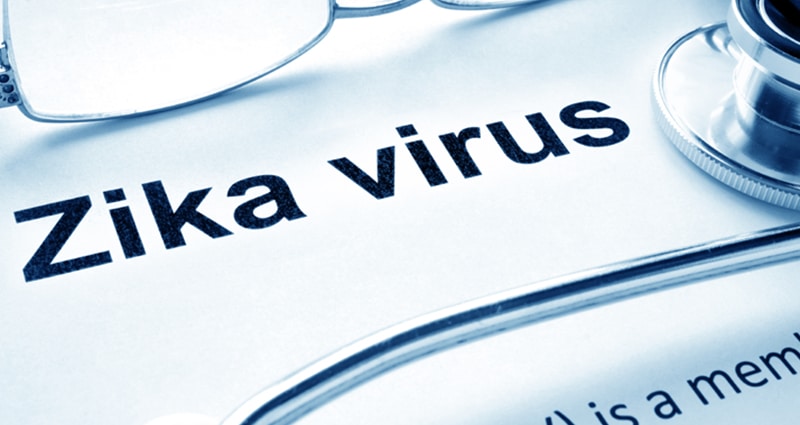Medical Advisory: What is the Zika Virus?

As the international headlines tell us, mosquito-borne diseases are having a global impact. Annually, 700 million people become ill with diseases spread by mosquitoes. Over 627,000 deaths were caused by malaria alone in 2012. The most recent news is information on the Zika virus. An increasing number of travelers are being diagnosed with this disease after they return home. What do YOU need to know?
ZIKA VIRUS
Zika virus is an emerging infectious disease that is transmitted to people through mosquito bites. Only one in five individuals will develop symptoms. Most people recover in a week. There is growing evidence linking the disease to birth defects and neurological complications, yet there currently are no vaccines and no cures for Zika virus.
Zika virus (ZIKV) belongs to a group of viruses called flaviviruses. The group also includes dengue, Japanese Encephalitis, West Nile virus and yellow fever. Zika is present in tropical areas of Central America, the Caribbean, South America, Africa, Southeast Asia and some Pacific Islands.
BACKGROUND
Discovered in 1947, only occasional human cases of Zika were reported until 2007. The first large outbreak was documented in Yap, Micronesia in 2007. Sporadic cases have been reported in a number of countries. Following an outbreak in French Polynesia in 2013-14, and appearing in Bahia, Brazil in May 2015, the disease is spreading rapidly through the Americas. Travelers have brought Zika, without known active transmission, to the United States in the past year.
In parallel with these outbreaks, authorities in some locations have noted an increase in birth defects (such as microcephaly) and neurological complications (including Guillain-Barré Syndrome – GBS). With growing evidence that Zika may be responsible, the World Health Organization has declared that the association between Zika virus and microcephaly and other neurological disorders constitutes a Public Health Emergency of International Concern (PHEIC).
A number of health authorities are advising pregnant women to consider delaying travel to affected areas and, for those living there, to consider delaying pregnancy until the outbreaks are contained.
MEDICAL INFORMATION
Prevention: There is no vaccine to prevent Zika, so it is important to prevent mosquito bites. Due to the potential risk of birth defects, this is especially important for pregnant women. The virus can be transferred from mother to child. No reports exist of breast milk transmission. Possible transmission is through infected blood or sexual contact, but reports are rare.
Symptoms: Usually begin from 2-7 days after a mosquito bite and include:
- Fever
- Headaches
- Joint and muscle pain
- Rash
- Conjunctivitis (red eyes)
Diagnosis: No commercial testing is available. Testing is, however, performed by the Centers for Disease Control (CDC) and some state health departments. Preliminary reports indicate that researchers in Brazil may have successfully developed the first rapid-detection Zika test.
Prognosis:
- Usually a mild to moderate illness, resolves spontaneously in 2-7 days
- Associated with microcephaly (small head) in a newborn
- Associated with Guillain-Barré Syndrome
Treatment:
- No vaccine or treatment exists for the Zika virus, symptomatic care only
- Supportive rest
- Fluids
- Avoid aspirin and non-steroid anti-inflammatory agents, such as ibuprofen, unless a formal diagnosis of Zika is confirmed
Recommendations:
- Ensure all needed vaccinations are received
- Carry a travel health kit with bite protection supplies
- Practice on-going mosquito bite avoidance techniques
- Monitor the situation closely, especially if traveling to the upcoming August 2016 Olympics in Brazil
- Call your medical provider for additional assistance
- See your doctor before you travel – pregnant women should consider deferring travel to Zika-affected countries
Returning Travelers from Zika-affected areas:
- Monitor your health for two weeks – If symptomatic seek medical care and advise your doctor of your travel history
- If you are pregnant, or suspect you may be pregnant, and have two or more symptoms – seek medical care and advise your doctor of your travel history
MedAire recommends that pregnant women contemplating international travel consult a doctor for an individual risk assessment and advice as standard practice prior to any travel, regardless of destination. In addition to the infectious risks of any destination, it is important to consider the standard of available healthcare, and the availability of obstetric and neonatal specialist support, should it be required.
Disclaimer: This content has been developed for educational purposes only. It is not a substitute for professional medical advice. Should you have questions or concerns about any topic described here, please consult your medical professional.
MedAire’s 2016 Training Schedule
USEFUL LINKS
Australian Department of Health Zika Virus
Canadian Government Zika Virus
European Centre for Disease Prevention and Control Zika Virus Infection
The Lancet Zika Virus Resource Centre
NBAA Some Countries Requiring Mosquito Treatment for Business Aircraft in Wake of Zika Virus
Pan American Health Organization (PAHO) Zika Virus Infection
Public Health England Zika Virus
World Health Organization (WHO) Zika Virus Disease
World Health Organization (WHO) Guidelines for Testing the Efficacy of Insecticide Products Used in Aircraft (See Annex 1 for recommended methods)

Flight departments around the world rely on MedAire, an International SOS company, to reduce their travel safety risks. Crews are trained on the resources to manage in-flight illness and injury with onboard medical equipment and telemedicine assistance. On the ground, passengers and crew have one resource for medical referrals; guaranteed payments for medical expenses; assistance with lost documents and prescriptions; online and e-mail travel advisories; evacuation support and a host of other services.
http://www.medaire.com/
© 2024 MedAire Worldwide. All Rights Reserved.
Next ArticleRelated Posts

Understanding the Challenge of Turbulence-Related Injuries in Business Aviation
The challenge of managing air turbulence in business and private aviation is becoming increasingly evident due to the growing number of turbulence-related incidents affecting aircraft operators across the industry.

A Flight Toward Well-Being: The Changing Landscape of Mental Health in Aviation
As the Global Director of Aviation Health at MedAire, I have witnessed firsthand the incredible strides our industry has made in addressing mental health issues among pilots.

